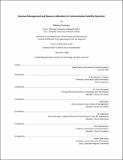Revenue management and resource allocation for communication satellite operators
Author(s)
Guerster, Markus.
Download1227276798-MIT.pdf (25.22Mb)
Other Contributors
Massachusetts Institute of Technology. Department of Aeronautics and Astronautics.
Advisor
Edward F. Crawley.
Terms of use
Metadata
Show full item recordAbstract
This dissertation presents the first academic study on Revenue Management (RM) for broadband communication satellite (satcom) operators. It proposes a satcom RM framework to structure, automate, and optimize operators' demand and capacity management. New entrants, increasing demand for data, digital payloads, and new phased array technologies are likely to remake the current satcom landscape. One of the challenges, old and new, operators face is how to manage demand and capacity. This work finds that airlines' tiered pricing and seat inventory control (known as RM) offers insights to the satcom market. The satcom industry shares many characteristics with the airline industry, such as inflexible capacity, low marginal sales cost, perishable inventory, heterogeneous customers, and variable and uncertain demand. Generally, those characteristics favor the implementation of an RM system. However, four unique challenges are discovered that require the extension of existing RM frameworks by a resource management part: First, the unit of capacity (Watts) is not the unit of demand (Mbps). Second, the resource allocation is an optimization problem itself. Third, available capacity is uncertain based on resource usage. And fourth, existing Service Level Agreements (SLAs) do not fully leverage the new satellites' flexibility. The dissertation proposes algorithmic solutions to each of these four challenges. It specifically focuses on the resource allocation process and its optimization of user terminal grouping, routing, frequency assignment, and power allocation. Finally, the value of the proposed satcom RM framework is demonstrated by applying it to a satellite operator's data. The results show that dynamic resource allocation frees up considerable capacity (38% in the analyzed scenario), which operators can monetize into additional revenues. More sophisticated RM algorithms lift the revenues between 4-7% compared to heuristic pricing policies.
Description
Thesis: Ph. D., Massachusetts Institute of Technology, Department of Aeronautics and Astronautics, September, 2020 Cataloged from student-submitted PDF of thesis. Includes bibliographical references (pages 303-320).
Date issued
2020Department
Massachusetts Institute of Technology. Department of Aeronautics and AstronauticsPublisher
Massachusetts Institute of Technology
Keywords
Aeronautics and Astronautics.